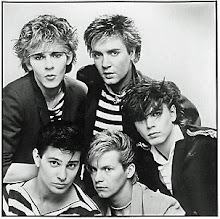Below is a sample blog post from several years ago as well as a response to that post from another student. I pasted them in from a word document in which I have made editorial comments which you should look at carefully as well.
#1 “Something was happening to him that was completely
unfamiliar to him, something new, unannounced and unprecedented. Less did he
understand than clearly sense with all the power of sensation that not only was
it impossible for him to address these people in the superintendent’s bureau
with the sentimental expansiveness he had lately employed- he could address
them on no other terms, either, and even if they had all been his very own
brothers and sisters, and not police lieutenants at all, even then he would
have had absolutely no reason to address them about any circumstances of his
life that he could possibly imagine; never until that moment had he experienced
such a strange and terrible sensation.” Part II, Chapter I, Page 126.
I really like this quote.[BD1] It
represents the moment when Raskolnikov realizes that by his crime he has truly
separated himself from the rest of society. Raskolnikov’s crime definitely[BD2] put
him into one of Foster’s categories of violence. That would be the category of
“the specific injury that authors cause characters to visit on one another or
on themselves.” Raskolnikov’s crime clearly injures another but it also hurts
him as well. Through his doings[BD3] he has
separated himself from society and from anyone who could help him. We can also
start to understand that there are different conflicts evolving in the novel.
The conflicts are Raskolnikov resolving his conflict with the authorities and
with Raskolnikov resolving the conflict with himself. He has a severe lack of emotions
which has allowed him to commit the crime and disconnect himself from society.
Due to this lack of emotion, Raskolnikov developed a sort of ego because he had
“stepped across the line.” With this ego he has suddenly found himself without
help and he must decide if he can go on like this or if it will cause him to
break down and try to reconnect with society.[BD4] I
think everyone can relate to this quote. I think we have all found ourselves in
a situation where we don’t really have anyone to talk to and we have to
struggle to decide if we can find someone who will love you[BD5]
anyways for your mistake or if you are going to force yourself to keep
something inside that will destroy you from the inside out. It’s all about
knowing your limits and the fact that Raskolnikov has entered into a world
where he is helpless, has scared him.
[BD1]Weak/informal
opening. Also somewhat redundant…you
wouldn’t have chosen it if you didn’t like it.
Start off with the thought expressed in the next sentence.
[BD2]“Definitely”
adds nothing to your point here, so don’t use it.
[BD3]There
are a plethora, a myriad, a virtually cornucopia of wonderful, specific words
in the English language, but “doings” is not one of them!
[BD4]There
is some VERY strong analysis here…I would argue that you have hit on one of the
central themes of the novel. The
conflict between the individual and society and within each individual between
the “rational” ego and the emotions is what the quote reveals and what you want
to develop further in this paper.
[BD5]You
shift person and number in one sentence!
Sample Response:
I have to disagree with the statement that Raskolnikov has a
severe lack of emotions. Throughout the book I found him to be very emotional,
even though it was internal. The entire quest that he ventures on in the book I
found to be centered on the emotions he felt. I guess that’s just me. I do have
a way of seeing things differently, and the struggles Raskolnikov felt in this
books were meant for the reader. What I mean is that if you read through the
eyes of the character, then you would be in a position where you are trying to
find yourself. That is how I interpreted the story. Truthfully, whether or not
Raskolnikov was emotional or wasn’t should vary from reader to reader based
upon how they put themselves in the situation.[BD1] So, in
the end there is no true answer to whether or not Raskolnikov is emotional, it
changes on how each person sees the situation when they put themselves into it.
It doesn’t portray what kind of person the reader is, just how they see
themselves in his situation. Wow I hope that ends up making sense......
[BD1]You
need to be careful here…Dostoevsky created Raskolnikov with specific (and
pronounced) emotional ambiguities.
Therefore it is perfectly acceptable, even expected, that Megan should
point to his lack of emotion and you to his sentimentality, but that does not
mean that any readers emotions can be read into Raskolnikov’s character.
